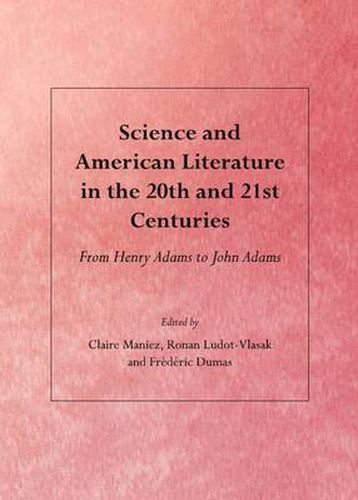Readings Newsletter
Become a Readings Member to make your shopping experience even easier.
Sign in or sign up for free!
You’re not far away from qualifying for FREE standard shipping within Australia
You’ve qualified for FREE standard shipping within Australia
The cart is loading…






Since its origin, American literature has always had an uneasy relationship with science: born at a time when science was becoming a profession, it repeatedly referred to it, implicitly or explicitly, in order to assert its difference or, on the contrary, to gain a certain form of legitimacy. The purpose of this book is to show how scientific discourse informs literary writing, and to consider the relationship the two types of discourse have maintained: mutual metaphorization, questioning or legitimating. Focusing on the literary production of the United States in the 20th and 21st centuries, the book is organized in four parts: the first one, which concerns the works of Henry Adams and Thomas Pynchon, examines the way in which literature writes a history of science; the second deals with the relationship between literature and the developing field of neurosciences, first from a theoretical perspective, then through the study of science-fiction novels; the third one includes essays which, one way or another, raise the issue of the ethics of science and offer a literary answer to the dilemmas raised by scientific progress; the two essays in the last part analyze how digital technology has influenced recent American writing and the consequences of this new mode on reading procedures.
$9.00 standard shipping within Australia
FREE standard shipping within Australia for orders over $100.00
Express & International shipping calculated at checkout
Since its origin, American literature has always had an uneasy relationship with science: born at a time when science was becoming a profession, it repeatedly referred to it, implicitly or explicitly, in order to assert its difference or, on the contrary, to gain a certain form of legitimacy. The purpose of this book is to show how scientific discourse informs literary writing, and to consider the relationship the two types of discourse have maintained: mutual metaphorization, questioning or legitimating. Focusing on the literary production of the United States in the 20th and 21st centuries, the book is organized in four parts: the first one, which concerns the works of Henry Adams and Thomas Pynchon, examines the way in which literature writes a history of science; the second deals with the relationship between literature and the developing field of neurosciences, first from a theoretical perspective, then through the study of science-fiction novels; the third one includes essays which, one way or another, raise the issue of the ethics of science and offer a literary answer to the dilemmas raised by scientific progress; the two essays in the last part analyze how digital technology has influenced recent American writing and the consequences of this new mode on reading procedures.